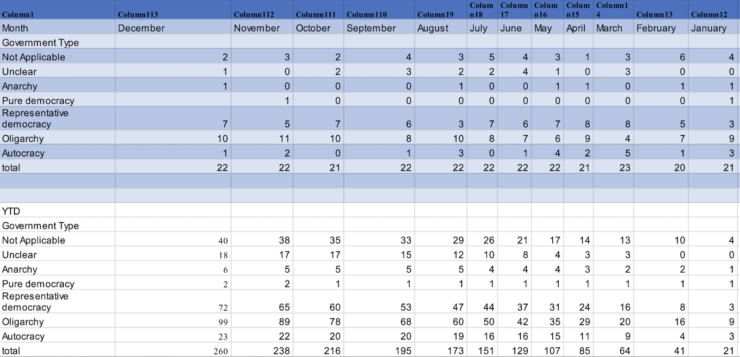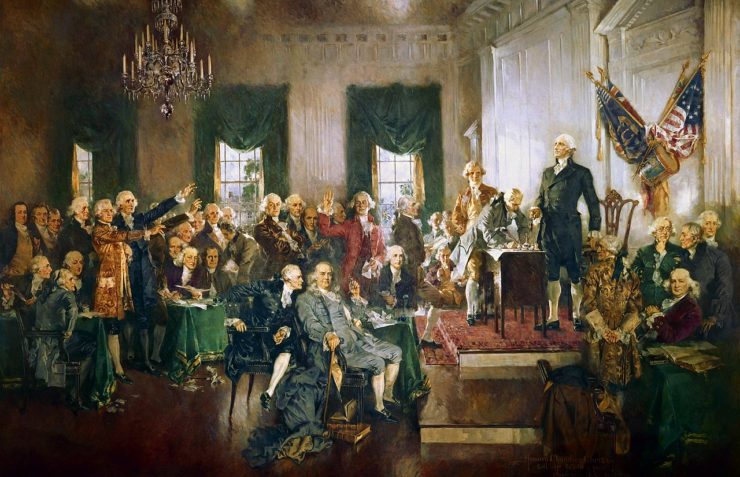Having complained about one particular aspect of science fiction and fantasy settings for decades, it belatedly occurred to me to start tabulating data to see if in fact there were any support for my impressions. Going on gut feelings is, after all, how I got stabbed with semi-molten glass.
And what, you ask, was the aspect being tracked? Try not to get too excited when I say it was “type of government depicted.” Are science fiction and fantasy as rife with autocracies as some have implied? Or is this merely an illusion, one to which I might be subject because I am personally rather tired of autocratic settings?
It’s been nearly a year since my project began. The results are not quite as I expected.
Methodology
I was torn between curiosity and sloth. Did I want to sample all SFF? If focusing on a representative sample, how would that be chosen? In the end, sloth won: I surveyed a subset of the reviews I have been posting on my personal website (James Nicoll Reviews). I’ve been posting since 2014; at the time I write this my site hosts 2268 reviews. A good sample but… I didn’t start collecting and posting stats re: government type until 2022. Sample size much smaller (260 reviews), but easy to tabulate, because I compiled stats at the end of each month. Adding up the monthly totals was simple.
The categories I assigned each work:
- Not applicable: anthologies, non-fiction texts, and other works that lack a single setting.
- Unclear: works where I could not figure out how government functions.
- Anarchy: works with no functioning governments.
- Pure democracy: works where all inhabitants have a say in communal decisions.
- Representative democracy: works where people select representatives to make decisions on their behalf.
- Oligarchy: works where a small group of people govern without meaningful input from the populace.
- Autocracy: works where a single person governs without meaningful input from the populace.
Works are categorized using the time-honored “I know it when I see it” system.
Disclaimers
The data set is not huge, although at more than 200 works I should see some real trends.
My categories are somewhat idiosyncratic, selected because sorting books into a limited number of sets is a lot easier than a more complicated array would be. (I cannot emphasize strongly enough how bone lazy I am.)
Bias cannot be ruled out, since I select many (but not all) of the works I review. Knowing something about the work beforehand may tempt me to pass over a story I suspect I would dislike. Balancing that, my patrons select many of the works reviewed, so the results are not entirely shaped by my personal tastes.
Results (as of December 31, 2022)
Government Types (books read in December): Total 22.
- Not applicable 3 (14%)
- Unclear 0 (0%)
- Anarchy 0 (0%)
- Pure democracy 1 (5%)
- Representative democracy 5 (23%)
- Oligarchy 11 (50%)
- Autocracy 23 (9%)
Government types (books read in 2022): Total 260.
- Not applicable 40 (16%)
- Unclear 18 (8%)
- Anarchy 6 (2%)
- Pure democracy 2 (0.5%)
- Representative democracy 72 (28%)
- Oligarchy 99 (36%)
- Autocracy 23 (9%)

Discarding Not applicable and Unclear, and sorting by frequency for books read so far this year:
- Oligarchy 99 (49%)
- Representative democracy 72 (36%)
- Autocracy 23 (11%)
- Anarchy 6 (3%)
- Pure democracy 2 (1%)
…This was a surprise. Yes, Oligarchy is in the lead but Representative democracy puts in a respectable second-place showing. Autocracy, seemingly so prevalent that certain persons have complained about how often it comes up, is only a distant third.
What could explain these results? A few things.
A. A surprising number of SFF works are set in contemporary Western societies and at the moment, a lot of those are representative democracies. Granted, some are more convincingly representative democracies than are other societies, but my categories are forgiving.
B. There’s a tendency for people to write what they know, even when they are setting works in the future or in a fantastical realm. This is especially the case if government isn’t the focus of the work. Adopting a familiar setting is easier than imagining a plausible but novel setting.
C. Anarchy and pure democracy may be disadvantaged by the fact that at this time, such governments are rare. Not only that, they are not currently being promoted or discussed with the fervor often shown in the 1960s and 1970s. If libertarians are mentioned these days, it seems to be mostly in the context of developments like bears overrunning a libertarian community. The wheel could turn. We could see more novels like The Probability Broach and Alongside Night at some point…but the wheel hasn’t turned yet.
D. Practicality. Rulers may decree that “I am the state” (l’État, c’est moi) but they would have a hard time implementing their orders if there weren’t a state apparatus to do that. But as soon as there are underlings or bureaucrats, those folks may use their position to sway policy. They can interpret orders from the top to suit their own beliefs or interests, or lackadaisically enforce orders they don’t like. There will be nepotism. Autocracies usually turn into oligarchies.
E. Oligarchies occupy a sweet spot from an authorial point of view. They are prone to faction, which makes for interesting plots. But there are few enough factions that it is easy to keep track of them all. Plus, leaders or prominent members of the factions can wield a lot of power, which helps generate plot and intrigue.
IMHO, these five factors appear sufficient to explain the results. Perhaps I am overlooking something? Feel free to explain what it is in comments, which are, as ever, below.
In the words of fanfiction author Musty181, four-time Hugo finalist, prolific book reviewer, and perennial Darwin Award nominee James Davis Nicoll “looks like a default mii with glasses.” His work has appeared in Interzone, Publishers Weekly and Romantic Times as well as on his own websites, James Nicoll Reviews (where he is assisted by editor Karen Lofstrom and web person Adrienne L. Travis) and the 2021 and 2022 Aurora Award finalist Young People Read Old SFF (where he is assisted by web person Adrienne L. Travis). His Patreon can be found here.










